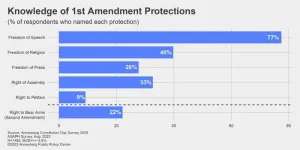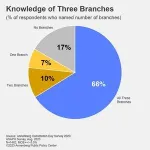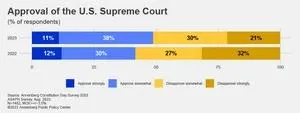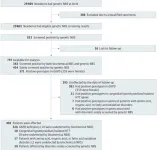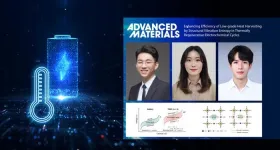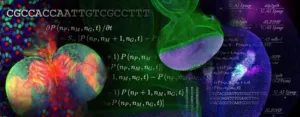(Press-News.org) PHILADELPHIA – Many Americans do not know what rights are protected under the First Amendment and a substantial number cannot name all three branches of government, according to the 2023 Annenberg Constitution Day Civics Survey.
The Annenberg Public Policy Center’s annual, nationally representative survey finds that when U.S. adults are asked to name the specific rights guaranteed by the First Amendment to the Constitution, only one right is recalled by most of the respondents: Freedom of speech, which 77% named.
The civics knowledge survey, released annually to celebrate Constitution Day (Sept. 17), also finds that although two-thirds of Americans (66%) can name all three branches of government, 10% can name two, 7% can name only one, and 17% cannot name any.
The Annenberg Constitution Day Civics Survey was fielded in a year of high-profile events that propelled the workings of government into the daily news cycle, which included four criminal indictments of former President Donald Trump; trials for those charged in the 2021 assault on the Capitol; Supreme Court rulings that sidelined race-conscious college admissions programs and a Biden Administration student-loan forgiveness plan; several justices being dogged by allegations of unethical conduct; the collapse of a plea deal to resolve a gun charge and tax offenses by President Joe Biden’s son Hunter; and discussions by House Republicans whether to open impeachment proceedings against Biden.
“It is worrisome that one in six U.S. adults cannot name any of the branches of government and that only 1 in 20 can name all five freedoms protected by the First Amendment,” said Kathleen Hall Jamieson, director of the Annenberg Public Policy Center and director of the survey. “One is unlikely to cherish or work to protect freedoms one does not know one has and will have trouble holding elected and unelected leaders accountable if one does not understand the nature and prerogatives of each branch and the ways in which the power of each is kept in check.”
How the survey is conducted – and what is different this year
The Annenberg Constitution Day Civics Survey is a nationally representative survey conducted annually in advance of Constitution Day by the Annenberg Public Policy Center (APPC) of the University of Pennsylvania. This year’s survey of 1,482 U.S. adults was conducted for APPC by independent research company SSRS from August 9-15, 2023. It has a margin of error of ± 3.5 percentage points at the 95% confidence level.
For the first time, the annual civics survey presented this year was conducted online rather than by telephone. The online survey, conducted as part of a wave of our Annenberg Science and Public Health (ASAPH) knowledge study, was self-administered, meaning that respondents completed it without an interviewer’s assistance. In 2022, we conducted two versions of our survey: one over the phone and one online. There, we found – as have similar studies from the Pew Research Center – that there were differences in some responses between online and telephone respondents. In our survey, online respondents generally had higher knowledge levels than phone respondents. Beginning with this year’s survey, we will be conducting the Constitution Day survey online only, and therefore we cannot fairly compare knowledge levels from this year to those gathered by phone in prior years. Because of this change in methodology, this year’s knowledge findings will not be presented as part of a historical trend.
We shifted from telephone to online surveys because phone surveys have become increasingly difficult to conduct reliably, with very low response rates. Accordingly, APPC, like other public opinion researchers and news organizations such as Gallup, Pew, NORC, and CNN, has decided to add or transition to online panels of nationally representative individuals. In an accompanying white paper, written by APPC research analyst Shawn Patterson Jr. and edited by our survey research team, we explain the interventions that we have tested and implemented to maximize the likelihood that responses reflect what respondents actually know. These interventions aim to discourage those who might otherwise consider looking up answers to unfamiliar questions in the online survey, a move less likely when being asked knowledge questions by phone.
“Whether giving people a chance to reread a question and search their memory for an accurate response is a better way to assess civic knowledge than asking top-of-mind recall over the phone is an open question,” Jamieson observed. “But whether one prefers online to phone questions or not, the bottom line across our surveys remains the same – a concerning number cannot muster the knowledge needed to exercise their constitutional rights or make sense of the workings of our system of government."
The survey was conducted under the supervision of Ken Winneg, Ph.D., APPC’s managing director of survey research, and the analysis and graphics were prepared by APPC research analyst Shawn Patterson Jr., Ph.D.
For the survey questions and data, read the topline. For more on the mode effects, see the white paper.
The three branches of government
The three branches: The 2023 survey found that 66% of U.S. adults could name all three branches of government – executive, legislative, and judicial – while 10% could name two of the branches and 7% could name only one. About 1 in 6 people (17%) could not name any branches.
Poor knowledge of First Amendment rights
The First Amendment: When respondents are asked to name the rights guaranteed by the First Amendment, the only right with widespread recognition is freedom of speech:
Three-quarters (77%) name freedom of speech.
Less than half (40%) name freedom of religion.
A third (33%) name the right to assembly.
Just over a quarter (28%) name freedom of the press.
And less than 1 in 10 (9%) know the right to petition the government.
In all, only 5% of the U.S. adults surveyed correctly name all five First Amendment rights while 30% could name three or four of the rights. Nearly half of those surveyed (46%) could name one or two First Amendment rights, and 20% could not correctly name any.
A surprisingly large number of respondents, over 1 in 5 (22%), replied by listing the right to bear arms, which is a right under the Second Amendment, not the First. We hypothesize that, seeing five empty text boxes, web panelists may have called to mind any other right with which they are familiar.
Freedom of speech and Facebook: Over half (53%) think it is accurate to say that the First Amendment’s protection of freedom of speech means that Facebook must permit all Americans to freely express themselves on Facebook pages, while nearly half (47%) say that is not accurate.
While the First Amendment protects citizens from government action to limit speech, courts have ruled that social media companies such as Facebook are private companies are not covered by it.
The Supreme Court and other issues
The survey asked knowledge questions and an attitude question about the court.
The Court: Over half of those surveyed (51%) disapprove of the way the Supreme Court is handling its job, while 49% approve. This finding is more positive than past surveys by APPC and other organizations. In APPC’s 2022 online panel, 42% approved of the court and 58% disapproved. By comparison, in August 2023 Gallup found Supreme Court approval at 40%.
Voting coalitions on the Supreme Court: Survey respondents were asked what percentage of Supreme Court cases in the past year they thought were decided by a 9-0 or 8-1 vote – a unanimous or near-unanimous vote. Respondents were invited to fill in a number between 0 and 100. A fifth (22%) offered answers that fell correctly in the 41%-60% range. Other responses were widely distributed – and on average, respondents thought 35% of the rulings were 9-0 or 8-1.
Though attention has been paid to the divisions on the court, with its 6-3 conservative-liberal split among the justices, over half the decisions in the 2022-23 term were decided by a 9-0 or 8-1 consensus.
The fact that so many decisions are effectively unanimous is surprising to many Americans, but it reflects something deeper about the court, says Matt Levendusky, a Penn political science professor and Stephen and Mary Baran Chair in the Institutions of Democracy at APPC. “While some high-profile issues are divisive, much of what comes before the court is not. On many issues, justices of all ideological stripes agree on what should be done. This is important to remember when assessing the court’s function as well,” Levendusky noted.
The meaning of a 5-4 ruling: Over 7 in 10 respondents (71%) accurately say that when the Supreme Court rules 5-4 on a case, the decision needs to be followed. In the survey, 16% say a 5-4 ruling means that a decision would be sent back to Congress for reconsideration, while 12% indicate that the decision is sent back to the federal court of appeals to be decided.
The constitutionality of an act by the president: If the president and Supreme Court differ on whether an action by the president is constitutional, who has the final responsibility for determining whether it is constitutional – the president, Congress, or the Supreme Court? Just over half of the survey respondents (54%) correctly say the Supreme Court, while 21% say Congress and 4% say the president. Another 21% say they are not sure or don’t know.
Civics education associated with knowledge
An APPC analysis found that reporting having taken a high school civics class continues to be associated with correct answers to civics knowledge questions, including knowledge of the three branches; knowledge of First Amendment rights; the meaning of a 5-4 Supreme Court decision; the Supreme Court having the final say on the constitutionality of a president’s actions; and knowing that Facebook is not covered by the First Amendment.
In 2023, nearly 6 in 10 (59%) of respondents with at least some high school education said they had taken a civics course in high school that focused on the Constitution or judicial system, about the same as in previous years we have asked this question. A third of those with at least some college education (33%) said they had taken a college course that focused on the U.S. system of government and the Constitution.
Constitution Day
The Annenberg Civics Knowledge Survey is released by APPC for Constitution Day, which celebrates the signing of the Constitution on Sept. 17, 1787. APPC’s initiatives to enhance civics education include Annenberg Classroom, which offers free resources for teaching the Constitution, and the Civics Renewal Network, a coalition of 43 nonpartisan, nonprofit organizations dedicated to improving civics education by providing free, high-quality resources for teachers. Among those resources: CRN’s Constitution Day Toolkit for teachers and Annenberg Classroom short films released this year on our nation’s newest holiday, Juneteenth, and on the landmark Supreme Court First Amendment case New York Times v. Sullivan, one in a series of award-winning videos.
The Annenberg Public Policy Center was established in 1993 to educate the public and policy makers about communication’s role in advancing public understanding of political, science, and health issues at the local, state, and federal levels.
END
Many don’t know key facts about US Constitution, Annenberg study finds
2023-09-14
ELSE PRESS RELEASES FROM THIS DATE:
All work and no play will really make a dull life - new research reveals
2023-09-14
The study across three countries led by the Department of Psychology’s Dr Paul Hanel discovered people who prioritised achievement over enjoyment were less happy on the next day.
Whereas those who aimed for freedom said they had a 13% increase in well-being, recording better sleep quality and life satisfaction.
And participants who tried to relax and follow their hobbies recorded an average well-being boost of 8% and a 10% drop in stress and anxiety.
Dr Hanel worked with colleagues at the University of Bath on the Journal of Personality-published study.
For the first ...
New poll shows 77% of Massachusetts residents support $600 child & family tax credit
2023-09-14
Boston, MA – New polling data released late last week shows 77% of surveyed Massachusetts residents support a $600 state Child and Family Tax Credit. This polling confirms the popularity of the more generous Child and Family Tax Credit included in the House tax package, which is under consideration alongside the Senate tax bill by a bicameral conference committee.
“The overwhelming support for a $600 tax credit per child matches up with the stories I have heard from families across my district, and the experiences of working Massachusetts families that they need more financial ...
New camera offers ultrafast imaging at a fraction of the normal cost
2023-09-14
WASHINGTON — Capturing blur-free images of fast movements like falling water droplets or molecular interactions requires expensive ultrafast cameras that acquire millions of images per second. In a new paper, researchers report a camera that could offer a much less expensive way to achieve ultrafast imaging for a wide range of applications such as real-time monitoring of drug delivery or high-speed lidar systems for autonomous driving.
“Our camera uses a completely new method to achieve high-speed imaging,” said Jinyang Liang from the Institut national de la recherche scientifique (INRS) ...
Peer-led patient navigation helps minoritized patients engage in their own mental healthcare
2023-09-14
INDIANAPOLIS – Research scientists led by Johanne Eliacin, PhD, of the U.S. Department of Veterans’ Affairs (VA) and Regenstrief Institute, have developed PARTNER-MH, an innovative, peer-led patient navigation program to support racially and ethnically minoritized veterans seeking mental healthcare, regardless of the types of mental health services needed or their mental health diagnoses.
In two peer-reviewed published papers they report significant improvements in mental health outcomes and high participant satisfaction with the program.
PARTNER-MH, developed for VA mental ...
Enhancing neonatal health: Genomic sequencing as a primary screening tool
2023-09-14
Newborn screening (NBS) is routinely performed across the world using biochemical testing methods. Recent advancements in genetic sequencing are a potential game-changer for newborn screening, swiftly assessing a comprehensive range of monogenic disorders. Yet, the effectiveness of genetic sequencing as an alternative method for NBS has not previously been studied.
To evaluate the outcomes of applying gene panel sequencing as a first-tier newborn screening test, a recent study conducted by eight NBS centers and BGI Genomics was ...
Take the money now or later? Financial scarcity doesn’t lead to poor decision making
2023-09-14
When people feel that their resources are scarce – that they don’t have enough money or time to meet their needs – they often make decisions that favor short-term gains over long-term benefits. Because of that, researchers have argued that scarcity pushes people to make myopic, impulsive decisions. But a study published by the American Psychological Association provides support for a different, less widely held view: People experiencing scarcity make reasonable decisions based on their circumstances, and only ...
Researchers make strides in harnessing low-grade heat for efficient energy conversion
2023-09-14
A team of researchers, jointly led by Professor Hyun-Wook Lee and Professor Dong-Hwa Seo from the School of Energy and Chemical Engineering at the Ulsan National Institute of Science and Technology (UNIST), in collaboration with Professor Seok Woo Lee from Nanyang Technological University in Singapore, has achieved significant breakthroughs in harnessing low-grade heat sources (<100 °C) for efficient energy conversion. Their groundbreaking work focuses on developing a highly efficient Thermally Regenerative Electrochemical Cycle (TREC) system capable of converting small temperature differences into usable energy.
Conventional energy-harvesting ...
New $50 million institute aims to use the power of math to model, predict biological processes
2023-09-14
Building a mathematics-based understanding of biology at all scales of life — from individual cells to interactions between species — is the goal of a new $50 million institute supported by the U.S. National Science Foundation in partnership with the Simons Foundation. The two organizations are each providing $25 million to launch the National Institute for Theory and Mathematics in Biology (NITMB). The institute will bring together experts across the mathematical and biological sciences to explore research challenges related to a broad range of topics and industries, such as the environment, biomedicine and biotechnology.
The institute will be led by Northwestern University ...
Preventing ground collapse through new AI-based monitoring
2023-09-14
As severe urban overcrowding is trending worldwide many underground development projects are being carried out in metropolitan centers worldwide. South Korea has experienced problems such as aging underground facilities and inaccurate information management due to rapid urban development since the 1970s and 1980s. Accident prevention has become a major challenge since accidents in underground spaces have occurred due to various causes.
The Korean government is undertaking projects to digitize underground facilities and ground information and establish a 3D underground space information database to prevent ...
Nation’s first dual degree in medicine and AI aims to prepare the next generation of health care providers
2023-09-14
The Joe R. and Teresa Lozano Long School of Medicine at The University of Texas Health Science Center at San Antonio (UT Health San Antonio) and the University College at The University of Texas at San Antonio (UTSA) are officially launching the first known program in the United States to combine medicine and artificial intelligence. A Doctor of Medicine (MD) from UT Health San Antonio and a Master of Science in Artificial Intelligence (MSAI) from UTSA will form a five-year MD/MS program enabling physicians trained in San Antonio to uniquely lead in the practical use of artificial intelligence to improve diagnostic and treatment ...
